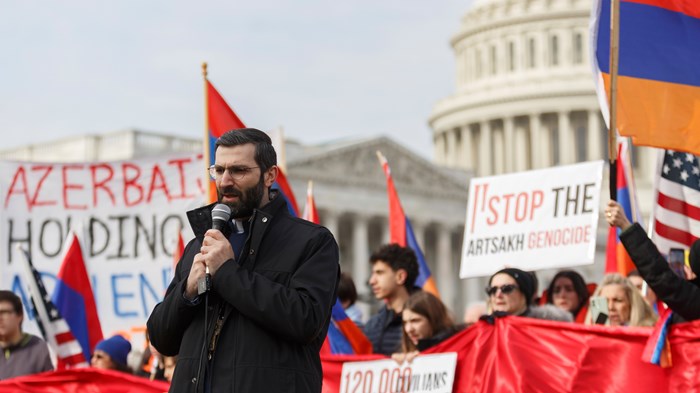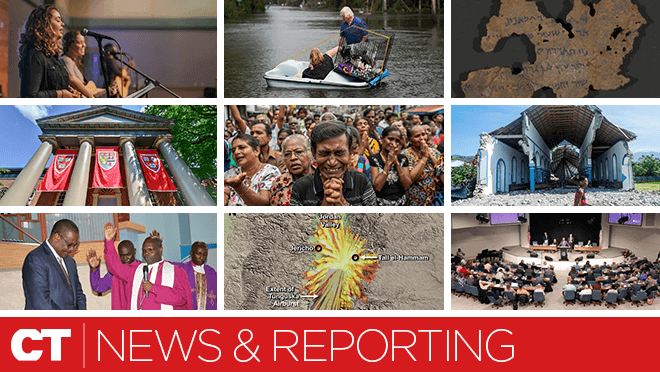
It was almost a good news story.
After nine months of blockade, humanitarian aid finally reached the Armenian Christians of Nagorno-Karabakh on Monday. But almost immediately, ending three years of tense ceasefire after a 2020 war, Azerbaijan renewed on Tuesday its military assault on the mountainous Caucasus enclave.
And following today’s surrender and promised disarmament of local separatist forces, the region will almost certainly revert to the sovereignty of a neighboring nation that Armenians fear—and a former chief prosecutor of the International Criminal Court warns—is preparing a genocide.
Thousands massed at the airport in the capital of Stepanakert, preparing to leave.
Advocates for Armenia are at a loss. But of the three aforementioned adjectives—humanitarian, Armenian, or Christian—which ones were most effective in pressing for humanitarian aid? And now in a new phase of the conflict, which will be the most crucial in mobilizing further support?
CT spoke with six religious freedom experts about best practices in Christian advocacy.
What compelled this week’s minor breakthrough?
One week before the initial agreement, US Secretary of State Antony Blinken called Aliyev to express “concern over the deteriorating humanitarian situation.” According to the official State Department readout, however, neither the word Christian nor Armenian was spoken by the senior diplomat. Religion and ethnicity were completely ignored.
But one CT source stated that Blinken’s outreach to Azerbaijan “ticked up” following the June visit to Armenia by Sam Brownback, former US ambassador-at-large for international religious freedom. And at a congressional human rights hearing on Nagorno-Karabakh after his return, in calling for legislative action his language was completely different.
“120,000 Christians are being suffocated,” Brownback stated, “blockaded by Azerbaijan.”
His trip was arranged through Philos Project, which works to ensure the citizenship rights of minority Christians and their ability to “flourish” in the region. President and founder Robert Nicholson said some believing advocates in the West are oddly reluctant to embrace their ancient brothers and sisters.
“Christians often make the mistake in thinking that the Christian thing to do is not specifically advocate for Christians,” he said. “But love for the brethren is the preeminent marker of New Testament faith, so I double down in my support.”
Like all sources interviewed, Nicholson resisted characterizing the Nagorno-Karabakh issue as Muslims persecuting Christians. Yet sectarianism is a factor, as both Armenia and Azerbaijan have effectively merged their religious and ethnic identities. And with the latter’s attempts to erase the former’s historic Apostolic faith from the enclave, Nicholson said it would be improper to neglect their status as Christians.
Both humanitarian concerns and religious solidarity were mentioned in Philos’s open letter to President Joe Biden in January. But in its bipartisan effort to influence US foreign policy, sometimes the word Christian is strategic to highlight.
“The best people on this issue have been Democrats,” Nicholson said. “Conservative Republicans who identify as Christians seem not to have gotten the memo, and we are trying to bring them in.”
So is Joseph Daniel, Middle East and North Africa manager for International Christian Concern (ICC), who handles its Armenia file. ICC’s public policy work, however, is a secondary priority to raising awareness in the church, with its persecution.org website aptly titled to get more believers to care. While such an approach helps with fundraising, he said it also puts them in a bit of a “Christian bubble.”
But for Armenia, the religious label is not sufficient on its own.
“Christians should not side with the confession ‘just because,’” said Daniel. “But advocating for the preservation of Christian heritage has value, independent of personal belief.”
ICC has turned down several requests by Armenian activists to highlight their cause when the issue was primarily military—or even humanitarian. But even during the Soviet era when the nation was Communist, Daniel said that advocating on behalf of a suffering people who consider themselves Christian would have been the right thing to do.
“Who are we to determine the necessary percentage of individual faith?” asked Daniel. “But where the light exists, however corrupted, God can still use it for the gospel.”
That is the primary motivation for the Armenian Missionary Association of America (AMAA), founded in 1918 in part to care for the survivors of the Armenian genocide in Turkey. Their evangelism concentrates on their ethnic kin—but by no means is their advocacy against Islam.
“We have experienced the love, welcome, and embrace of Muslim Arabs after the genocide,” said Zaven Khanjian, AMAA executive director. “Religious fervor is manipulated only by parties interested to enflame a crisis.”
Therefore, when AMAA speaks of Artsakh to the wider world, the focus shifts to human rights and ethnicity.
“Christians in America have an obligation to support Armenia against a clear and viable intent of ethnic cleansing,” Khanjian said. “But what moves everyone is humanism, and the state, with no religious affiliation, has an obligation to uphold the values of freedom and justice around the globe.”
So also must Christians, argues Michel Abs, not least in the Middle East.
As secretary general of the Middle East Council of Churches (MECC), alongside his advocacy for the rights of Syriac Christians he has petitioned on behalf of Zoroastrian Yazidis, heterodox Shiite Alawites, and Palestinians—most of which are Muslim. What matters, he said, is not their specific faith but their regional citizenship. Thus, when he issued the council’s letter on behalf of the blockade in Artsakh, he made no mention of religion.
“Everyone in the Middle East knows we are dedicated to the Christian presence in the region,” said Abs. “And to emphasize our religious identity in the West makes cheap use of our faith, showing us as a pitiful people.”
Instead, from the strength of the love of Christ, Christians must defend all. Where our people are wrong, he said, he would counsel them accordingly. The world is becoming a mosaic, and Christian distinctives must bring us together.
“The cross is our inspiration,” Abs said. “We must not crucify others.”
According to Wissam al-Saliby, there is a particular distinctive that helps.
“Our advocacy puts the human—made in the image of God—above every other distinction,” said the advocacy officer at the United Nations for the World Evangelical Alliance (WEA). “And diplomats have praised our multi-faith efforts, sharing with us that it gains more traction than anything single-faith.”
Recent advocacy in India, for example, has involved Muslims and Hindus.
Representing over 140 national alliances, Saliby said the WEA is driven by the concerns of local evangelicals. In some countries the message is distinct, if evangelicals suffer uniquely. In other countries, current or historic interchurch dynamics push leaders away from ecumenical engagement. And in others still, believers find themselves on conflicting sides, so peacemaking is prioritized.
But where possible, such as in Nagorno-Karabakh, collaboration is best. The WEA statement to the UN Human Rights Council in March was issued jointly with the World Council of Churches, and made no specific mention of Christianity.
“Our advocacy is for freedom, human rights, and dignity for everyone,” Saliby said. “It is easier said than done sometimes, so we need to discern in prayer how best to speak up and engage with the authorities.”
This same process has led Stefanus Alliance International to not advocate for Nagorno-Karabakh at all. A Norwegian Christian mission and human rights organization, its European orientation prefers the language of freedom of religion or belief, which is not at stake in the blockade.
“If you want to play a card, the religious one plays well to get support,” said Ed Brown, the American secretary general of Stefanus, of tendencies in US-based Christian advocacy. “But it can also exacerbate the situation and contribute to the long-term problem.”
Religion is a factor in the enclave, he emphasized, but it is only one of many. Historical grievances in the Caucasus go back decades, and each side has often demonized the other. In the case of Nagorno-Karabakh, the ethnic Armenians are truly suffering and deserve support. But honest human rights work must also acknowledge their prior abuses as an occupying power.
Victims in one situation may end up being violators in another, Brown said, and advocacy must adjust accordingly.
But though the religious label is not the focus of conflict in this current crisis, might it be useful to center in others?
“It depends, and I think we need both approaches,” Brown said. “But at the end of the day, in any given context, it is hard to know what works best.”
So why did Blinken get involved?
A mere 21 hours after tweeting his commendation of the humanitarian aid agreement, the US secretary of state called for an immediate cessation of “unacceptable” hostilities. Four hours later he reported speaking directly to Aliyev.
Azerbaijan pressed forward anyway.
Has all advocacy been for naught? Armenians lament that Western powers continually “warn,” but failed to link aggression to specific consequences. Now in a new stage of the conflict, they and their allies will redouble their efforts.
Nicholson, the Philos Project president, felt vindicated—in both assessment and support.
“Azerbaijan has shown its true face to the world, and we advocates were the ones to help expose it,” he said. “It just goes to show what a small group of committed people can do, with God’s help.”

Support Our Work
Subscribe to CT for less than $4.25/month















